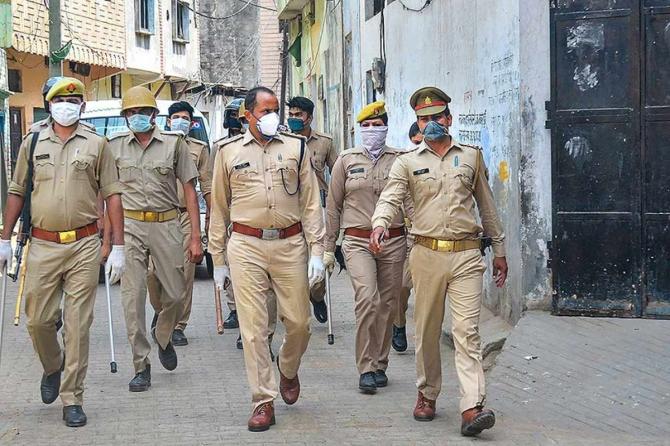Ultimately, whether the UP ordinance is struck down by the courts or not, it will be the courage of young Hindu and Muslim women and men that will act as a foil to the UP police-cum-mobs who will be out to get them.
Jyoti Punwani reports.

Consider these two contradictory statistics:
Last month, 125 Hindu-Muslim couples in Uttar Pradesh got protection from the Allahabad high court.
In the last one week alone, three such couples have been forcibly separated by Hindutva mobs acting in coordination with the UP police.
One of these couples was on the point of registering their marriage under the Special Marriage Act, an act that does not require conversion.
What caused this drastic change?
Two things.
First, the UP chief minister's public warning on October 31 to Muslim men that if they dare to marry Hindu women by fraud, they would not only be prosecuted by a strict new law, but they should also prepare for death ('Ram naam satya ki yatra nikaali jaayegi').
(Since Hindutvavadis believe that all such marriages are based on fraud, the qualifier didn't matter.)
As his legion of fans boasts, Yogi Adityanath doesn't just talk: what he says is implemented on the ground.
The new law came into force as an ordinance on November 28.
Since then, it has been implemented by Hindutva vigilantes acting in coordination with the police.
So far, 10 Muslims have been arrested and 24 booked for having married, wanted to marry, or helped others in marrying Hindu women.
The modus operandi is simple:
i. Hindutva groups inform the police of such marriages, and the police swing into action.
ii. Goons lie in wait inside courts for Hindu-Muslim couples to show up, and then pounce upon their prey. The police then take away the boy and his relatives.
The irony is that a law, enacted supposedly to 'protect' the izzat of 'hamari betiyan', has turned these Hindu 'betiyan' into protectors of their Muslim husbands/lovers.
Videos of the two latest cases of such action show Hindu girls confronting mobs and the police, forces far more powerful than them.
In Aligarh, a young girl held back by two policewomen cries out on a crowded road: 'Mujhey ussey alag mat karo, bahut pyar hai mujhe ussey, bahut zyada; woh meri jaan hai (Don't separate us, I love him very much; he's my life).'
In India, such public declarations of love by girls are seen only in movies.
In another case, where such a marriage was prevented even as Hindu rituals were about to start, it is the Hindu girl's mother who asserted what is at the heart of this issue: 'It is no one's business whom my daughter gets married to.'
We have Hindutvavadis to thank for having made Hindu women shed their inhibitions and assert their autonomy.

***
Adityanath's ordinance is not the first law aimed at preventing Hindu-Muslim marriages. In its provisions and even its language, it is similar to two existing laws: The Uttarakhand and Himachal Pradesh anti-conversion laws, which include marriage as a fraudulent means of conversion.
There also exist the 2017 Rajasthan high court guidelines which aim to make marriages that involve conversion an offence; these guidelines have the force of law.
It is important to stress that two provisions of the UP ordinance have already been struck down by the Himachal high court way back in 2012.
A two-judge bench, hearing an appeal by a Christian organisation against the 2006 Himachal Pradesh anti-conversion law (enacted by a Congress government), held that the provision that mandates advance notice to a district magistrate of one's intention to convert, violated the fundamental right to privacy, endangered the life of the convertee and could lead to communal clashes.
The court also struck down the provision stipulating that reconversion to one's original faith cannot be termed 'conversion', and is therefore free from the rules that restrict conversion to another faith. This provision violated the right to equality, the court stated.
Despite that, last year, Himachal Pradesh's Bharatiya Janata Party government amended its 2006 law to include these two provisions!
And in 2017, two judges of the Rajasthan high court, disregarding the 2012 decision of two judges of the Himachal Pradesh high court, made it mandatory for anyone wanting to convert for marriage to inform the district magistrate in advance.
The DM would then display the information and the marriage could only take place a week after the conversion.
So Adityanath's government can hardly be blamed for ignoring the Himachal high court judgment.
Like UP's ordinance, the Uttarakhand and Himachal laws also reverse the principle on which our criminal laws are based: 'Every accused is innocent till proven guilty'. They shift the burden of proof on the accused. The person who carries out the conversion must prove that it was genuine.
However, there are two crucial differences between Adityanath's ordinance and the laws and guidelines in Uttarakhand, Himachal and Rajasthan.
- The definition of marriage as an offence. The UP ordinance is the first to make 'conversion for the sole purpose of marriage' an offence.
This is an obvious violation of the fundamental right to freedom of conscience.
Probably afraid to violate this Constitutional right, the other three laws/guidelines refer only to 'marriage for the sole purpose of conversion' -- an offence impossible to prove. - The powers of prosecution given to the police by Adityanath's government.
In Uttarakhand and Himachal Pradesh, any prosecution under the anti-conversion law can only be launched with the permission of the district magistrate.
Even investigation by the police will only take place under the DM's command.
That check does not feature in the UP ordinance, and the results are evident before us.

***
Anti-conversion laws have existed since the 60s and are in force in eight states. But not much noise has been made against them, not even against the Uttarakhand, Himachal and Rajasthan laws/guidelines that target inter-faith marriages, for two reasons: convictions and even arrests have been rare.
It is only after 2017 that arrests have picked up. In Jharkhand and Madhya Pradesh, Christians have been arrested for allegedly trying to convert tribals and scheduled castes. Though in these cases too, the police have acted at the behest of Hindutva groups, our 'secular conscience' has not been stirred by the arbitrary arrests of poor, unknown Christians.
The PIL now filed in the Supreme Court against the UP ordinance also seeks to strike down the Uttarakhand anti-conversion law, while remaining silent on the Himachal Pradesh law and Rajasthan high court guidelines.
Such laws, however, have in the past been nullified by other ways: The use of political power as well as the force of public opinion.
Governors have refused to sign anti-conversion laws passed by state governments. A UPA-appointed governor refused to sign the Rajasthan BJP government's anti-conversion bill of 2006. So the Rajasthan high court stepped in to fill this gap!
In MP and Chhattisgarh too, UPA-appointed governors foiled amendments to existing anti-conversion laws made by BJP governments in 2006. These amendments would have required advance notice being given of conversion.
Then there's the force of public opinion.
Just before the 2004 general election, then Tamil Nadu chief minister J Jayalalithaa repealed the anti-conversion law introduced by her own government in 2002. She lost anyway.
More significant is the open declaration by Arunachal Pradesh Chief Minister Pema Khandu last year, on the eve of the assembly election there. Speaking at a Christian meet, he said he was considering scrapping the state's anti-conversion law enacted as far back as 1978, because it targeted Christians and 'could be misused by irresponsible officials'.
Khandu won the election. Christians form 32% of Arunachal Pradesh's population.
But neither of these factors will work in UP. In fact, if elections were to be held now, Adityanath would tout this law as a trump card.
Will the Supreme Court take up the challenge to the UP ordinance? Till it does, how many Muslim men will be beaten up and arrested; how many marriages will be broken?
In 2012, Justices Dipak Gupta and Rajiv Sharma of the Himachal high court had asked: 'Why should a human being be asked to inform the authorities that he is changing his belief? What right does the State have to direct the convertee to give notice in advance?'
Will these questions be asked of the UP government?
More importantly, what happens even if they are asked?
For UP is like no other state. No other BJP CM openly declares his hostility towards Muslims, and encourages his police and his followers to commit violence against them.
It's worth noting that other BJP CMs are from the Rashtriya Swayamsevak Sangh, Adityanath is not.
The difference between UP and the other BJP-ruled states can be seen from just two incidents.
In 2018, Uttarakhand became the first state to enact a 'love jihad' law, that too at the behest of a single judge of the high court. Yet, soon after that law was passed, the Uttarakhand police actually saved two Muslims found with Hindu girls from being lynched by Hindu mobs.
Ultimately, whether the UP ordinance is struck down by the courts or not, it will be the courage of young Hindu and Muslim women and men that will act as a foil to the UP police-cum-mobs who will be out to get them.
Perhaps it's time for a counter-protection 'army' of youth to be created to protect such couples in court.
Feature Presentation: Aslam Hunani/Rediff.com










